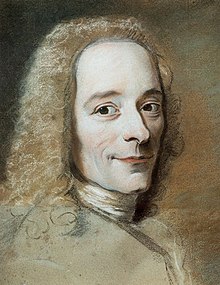Le Mondain
| "Le Mondain" | |
|---|---|
| by Voltaire | |
 Portrait of Voltaire from 1735, by Maurice Quentin de La Tour | |
| Written | 1736 |
| First published in | 1736 |
| Country | France |
| Language | French |
| Subject(s) | philosophy, paradise |
"Le Mondain" ("The Worldling" or "The Man of the World") is a philosophical poem written by French enlightenment writer and philosopher Voltaire in 1736. It satirises Christian imagery, including the story of Adam and Eve, to defend a way of life focused on worldly pleasure rather than the promised pleasure of a religion's afterlife. It opposes religious morality and especially the teaching of original sin. Its points echo Voltaire's prose works Lettres philosophiques and Remarques sur Pascal. Voltaire noted a trend against using poetic forms to make philosophical arguments, and wrote "Le Mondain" in deliberate opposition to this trend.[1]
Content
[edit]The poem is set in the Garden of Eden but, contrary to the teaching of original sin, Eden is not portrayed as a paradise from which man would be expelled, but a state of barbarity. Adam's nails are described as long and dirty since no-one has yet invented a tool to trim or clean them. The implication is that the world we experience is hence not a prison into which we have been thrown as punishment.[2] Instead, the poem's closing line says, "Le paradis terrestre est où je suis" ("The earthly paradise is where I am.")
Reaction
[edit]Line 22 of the poem, "Le superflu, chose très-nécessaire" ("The superfluous, a very necessary thing"), became a common catch-phrase.[1][2]
Responding to hostile reactions in 1737, Voltaire wrote a poem in the same style, Défense du Mondain ou l'apologie du luxe ("Defense of the Worldling or an Apology for Luxury").[2] The themes of the two are somewhat different; "Le Mondain" focusing on the personal benefits of worldly pleasure, while the Défense talks about the social benefits of seeking pleasure.[1]
The French dramatist Alexis Piron wrote a poem in response, L'Antimondain, in 1738.[1]
The poem's publication caused a scandal which led to Voltaire fleeing in 1738 from the Chateau de Cirey in France to Brussels, where he spent three months before returning.[3]
The poem has been described as embracing the doux commerce philosophy.[4]
Published editions
[edit]- "Le Mondain" – Critical edition by Haydn T. Mason, in Œuvres complètes de Voltaire, Volume 16 (Voltaire Foundation, Oxford) ISBN 0729407942
References
[edit]- ^ a b c d "Introduction" in "Le Mondain" – Critical edition by Haydn T. Mason, in Œuvres complètes de Voltaire, Volume 16 (Voltaire Foundation, Oxford) ISBN 0729407942
- ^ a b c Hont, Istvan (2006). "The early Enlightenment debate on commerce and Luxury". In Goldie, Mark; Wokler, Robert (eds.). The Cambridge History of Eighteenth-Century Political Thought. Cambridge University Press. pp. 413–414. ISBN 9780521374224.
- ^ Chisholm, Hugh, ed. (1911). . Encyclopædia Britannica (11th ed.). Cambridge University Press.
- ^ Graeme Garrard (9 January 2003). Rousseau's Counter-Enlightenment: A Republican Critique of the Philosophes. SUNY Press. p. 17. ISBN 978-0-7914-5604-0.
Further reading
[edit]- Cronk, Nicholas. "The epicurean spirit: champagne and the defence of poetry in Voltaire's Le Mondain", Studies in Voltaire and the Eighteenth Century 371 (1999), pp. 53–80.
External links
[edit] French Wikisource has original text related to this article: Le Mondain
French Wikisource has original text related to this article: Le Mondain
